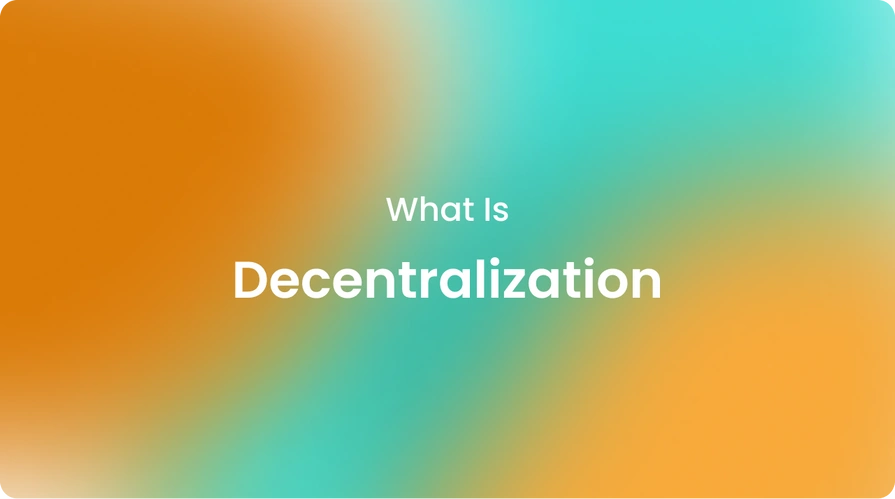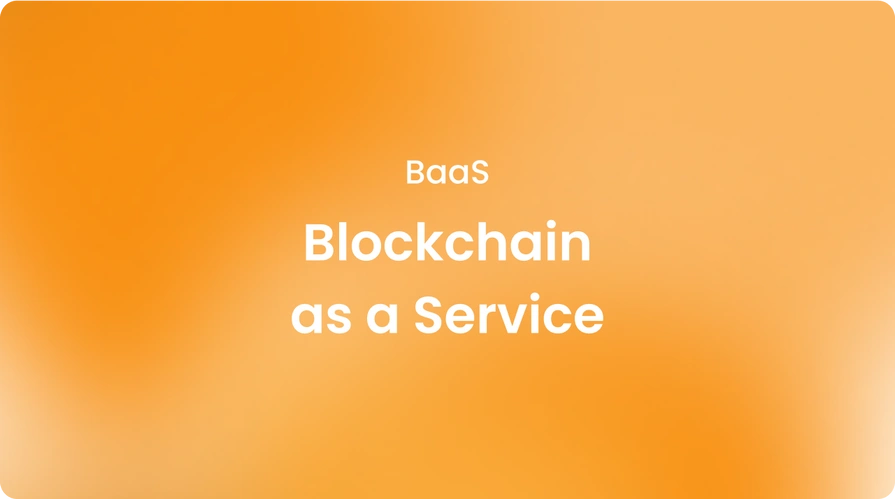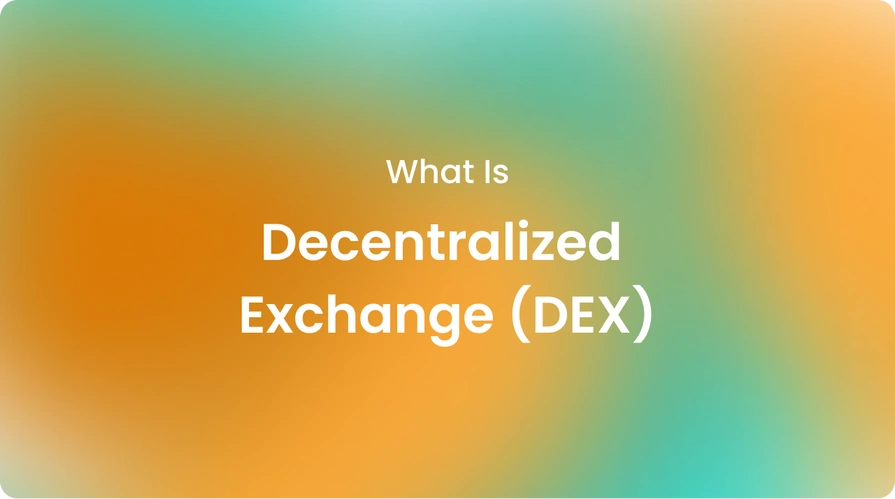|technology, knowledgehub
What Is Decentralization?

Decentralization becomes more prominent in many areas each day, including finance, and changes the way things work. Decentralized finance, or DeFi for short, has grown rapidly in recent years and is poised to disrupt the traditional financial system.
Join us in this blog as we explore the meaning of decentralization, the types of decentralization witnessed in the crypto world, the advantages it provides, and how stablecoins are leveraging the power of decentralization.
Decentralization refers to dispersing power away from a centralized authority and decentralizing it among various participants. In the online world, it means removing centralized control over data, platforms, and applications.
A key characteristic of a decentralized system is that it does not have a single point of failure; if one blockchain node goes down, others can still function independently to keep the whole blockchain system working.
What does decentralization mean?
Simply put, decentralization means distributing control so that no single person or entity has unilateral power over the network. This prevents censorship and manipulation.
Decentralized networks have no central pillars that, if taken down, would cause the entire system to collapse. Individual users gain autonomy and are not dependent on any centralized third party, thanks to the decentralized nature of blockchain technology.
What are the types of decentralization?
There are a few types of decentralization prevalent in the crypto world:
Protocol decentralization
Cryptocurrencies are protocol-decentralized, as no single entity controls the protocol rules or updates. Changes happen through community consensus mechanisms.
Architectural decentralization
Crypto networks are architecturally decentralized, as there are thousands of nodes globally validating transactions instead of a centralized authority.
Political decentralization
Decentralized autonomous organizations (DAOs) operate through decentralized voting to make autonomous, protocol-level decisions without centralized control.
Geographic decentralization
Thousands of nodes globally store leading cryptocurrency ledgers, ensuring geographic decentralization.
Why does decentralization matter?
Decentralization empowers individuals by transferring control from centralized intermediaries to users. It increases transparency as transactions happen on distributed blockchain public ledgers.
Users gain financial sovereignty without dependence on centralized gatekeepers like banks or payment processors. Decentralized networks are also more resilient and secure, as there is no single point of failure.
What are the benefits of decentralization?
Decentralization has many tangible benefits in the cryptocurrency world:
Censorship resistance
Any centralized third party cannot block or reverse transactions, such as crypto payments.
Increased privacy
Users can transact pseudonymously without divulging personal details.
Efficiency
Removing intermediaries like banks lowers transaction costs. Near-instant global payments and cross-border payments become possible.
Innovation
Decentralized systems empower developers to build innovative applications using open protocols, such as decentralized applications.
Accessibility
Anyone with an internet connection can participate, regardless of their location or background. Over 1.7 billion unbanked people can gain access thanks to decentralization.
What is decentralization in crypto?
As mentioned earlier, popular cryptocurrencies demonstrate decentralization in various aspects: they are not controlled by any single authority, they disperse data across thousands of global nodes for validation, and they undergo changes through community consensus rather than central mandates.
This architectural decentralization forms the backbone of cryptocurrencies and is a defining characteristic that distinguishes them from traditional centralized systems. Therefore, there are many benefits of cryptocurrencies over regular centralized currencies through decentralized power.
How is crypto decentralized?
Different cryptocurrencies employ decentralization differently:
- Bitcoin achieves decentralization in crypto mining through its global mining pool and node operation. Its core development follows community consensus with proof of work.
- Ethereum is similarly decentralized, with its global pool of miners and validator nodes securing the network through proof-of-work or proof-of-stake.
- Cardano relies on an advanced proof-of-stake model called Ouroboros to achieve security and decentralization via randomly selected stake pools.
- Monero uses ring signatures and stealth addresses to achieve privacy and censorship resistance.
Are all cryptocurrencies decentralized?
While the fundamental goal of cryptocurrency projects is decentralization, in practice, the degree achieved varies significantly. At one end of the spectrum, cryptocurrencies have very limited centralization tendencies due to the factors mentioned above.
On the other hand, some projects centralize power to differing extents through aspects like:
- Concentrated developer teams control software updates.
- Pre-mine allocations that place large proportions of the supply in founders' or investors' hands from the start.
- Insufficient node count or reliance on a handful of large mining pools.
- Unclear or non-existent treasury structures for funding ongoing development.
- Centralized crypto exchanges also curb decentralization by holding large quantities of users' funds with less transparency than decentralized exchanges.
While most crypto projects aim for decentralization as a goal, some achieve it better than others, depending on their specific network parameters and concentrations of power.
Therefore, the more a cryptocurrency distributes validation and control through transparency, the more decentralized it can be considered.
Why is decentralization good for crypto?
Decentralization is a key distinguishing feature that makes cryptocurrencies superior to centralized systems. It protects them from censorship, fraud, or downtime due to a single point of failure.
Users can autonomously participate in validating transactions and network consensus without relying on intermediaries or regulations. This independence fosters censorship resistance, accessibility, and greater innovation on open protocols. Therefore, decentralization is good for crypto.
Are stablecoins decentralized?
Stablecoins aim to maintain price stability, usually through fiat currency backing. While some have centralized elements, programmable stablecoins engineered for the decentralized finance ecosystem leverage decentralization principles.
Cryptobunq securely issues and audits the EURK stablecoin, ensuring its reliability as a stablecoin. Being blockchain-based, EURK achieves transparency through distributed ledgers while maintaining a 1:1 peg with euros through multiple reserves.
CBQ is a one-stop-shop crypto service provider that offers euro stablecoin advantages as well as other crypto solutions, from exchange APIs to batch payments. You can easily integrate our expert services into your business and adapt to the blockchain ecosystem.
Why is decentralization the future?
By removing power monopolies and ceding control to individuals, decentralization allows for the free flow of value without borders or intermediaries extracting rents along the way. It gives power to the edges rather than centralizing around vulnerable hubs.
With no intrinsic systemic risk from central points of failure, a decentralized future promises greater resilience, access, and innovation. New products like DeFi are rewiring finance on these principles.
An open, permissionless framework that is not owned by any single entity empowers individuals and serves global needs better, making decentralization a promising future. Therefore, it provides a promising future.
The bottom line
From the rise of Bitcoin to the growing popularity of decentralized finance platforms, cryptocurrencies have unstoppably advanced the cause of decentralization. This disruptive force can change not just the financial industry but many others as well by redistributing trust from monopolies to consensus.
Companies keeping pace with this change could help build a decentralized future. Cryptobunq with the euro stablecoin EURK offers one way to participate while leveraging crypto in a convenient, regulated manner.
DeFi is growing exponentially, and decentralization is at its core; the implications could just be beginning. Additionally, the future of cryptocurrencies and decentralization seems bright thanks to blockchain technology. If you want to benefit from blockchain-powered crypto services, CBQ is here for you.
Contact us and explore the world of blockchain with Cryptobunq. Start to grow your business with innovations and secure crypto solutions today!













